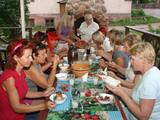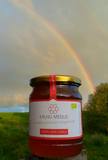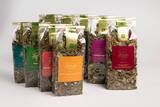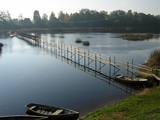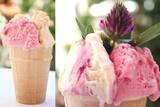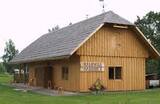| Nr | Nosaukums | Apraksts |
|---|---|---|
|
"Spēlmaņu krogs" atrodas Alsungas centrā pie Dižgabalkalna. Krogā var nobaudīt sklandraušus un uz vietas ceptu suitu skābmaizi. Vasarās tūristu grupas uz āra kamīna var piedalīties suitu ēdienu (ķiļķēni, žāvētas ribas u.c.) gatavošanas procesā vai mieloties jau pie klātiem galdiem suitiskā garā, kā arī baudīt Suitu sievu (unikālais burdona dziedājums) iespaidīgo priekšnesumu. |
||
|
Vieni no retajiem Latvijas tāšu pinējiem piedāvā iepazīt darbnīcu, apskatīt no tāsīm darinātus priekšmetus un dalīties pieredzē. Ikviens interesents ar meistaru palīdzību no bērzu tāss var izgatavot vienkāršus priekšmetus, kas noderēs kā lieliski suvenīri. |
||
|
Amatnieku darbnīcā tiek izgatavotas dažādas praktiskas pirtslietas – bļodas, ķipīši, kubuli, vannas un vannītes, pirtsslotas, linu izstrādājumi un pirts guļbūves. Piedāvā darbnīcas apskati, līdzdalību amatnieka darbā, pirtslietu iegādi un pasūtījumus. |
||
|
Apmeklētāji var iepazīt darbnīcu, vērot meistaru darbībā, veidot paši, kā arī iegādāties māla izstrādājumus (t.sk. dārza keramiku) un apskatīt skaisto dārzu. |
||
|
Pirts Muzejs ir privāts brīvdabas muzejs, kas dibināts 2008. gadā. Tas atrodas 40 km no Rīgas pie Murjāņu - Saulkrastu ceļa. Pirts Muzeja ekspozīcija sastāv no sešām vēsturiskām un vienas jaunuzceltas pirts. Tās visas darbojas, taču saimnieki īpaši iesaka izbaudīt melno pirti. |
||
|
Atrodas netālu no Biksēres muižas, blakus muižas parkam. Ozolkalna klēts saimniece Līga Kuba aušanas prasmes pirms pāris gadiem apguvusi Sarkaņu amatu skolā. Šeit radusies iecere par privātas aušanas darbnīcas izveidi, kas arī īstenota. Saimniece savas aušanas prasmes nodod jebkuram interesentam. Apmeklētāji var iegādāties šeit darinātos suvenīrus. |
||
|
Bišu drava "Kalnu Medus" atrodas Vidzemes augstienē, un vasaras sezonā ir iespējams doties ekskursijā pa dravu, degustēt biškopības produktus, kā arī doties tējzāļu ievākšanas tūrē. Piedāvā svaigi sviestu dabīgu bioloģisku medu un plašu svaigu ziedputekšņu klāstu. |
||
|
Z/s “ Kurmīši“ ārstniecības augu lauki atrodas ekoloģiski tīrajā un ainavām bagātajā dabas parka “ Daugavas loki “ un Aizsargājamo ainavu apvidus “Augšdaugava” teritorijā. Lai neiznīcinātu dabiskās ārstniecības augu augšanas vietas, “Kurmīšu” laukos kopš 1994. gada tiek audzēti aptuveni 40 ārstniecības augu sugas un šķirnes. Ārstniecības augu audzēšanas entuziastiem un tūristiem piedāvā iepazīties ar ārstniecības augu audzēšanas un sagatavošanas noslēpumiem. Pēc ekskursijas iespēja nodegustēt un iegādāties „Kurmīšu” zāļu tējas, kas vislabāk garšo kopā ar medu, kuru bites ir vākušas no saimniecībā augošajiem ārstniecības augiem. Īpašu gaisotni rada bišu vaska sveces. Saimniecībā ir izveidotas atpūtas vietas, vaska sveču lietuve, var iegādāties bagātīgu, - no vaska veidotu suvenīru klāsta, iepazīt bišu dravu. Saimnieks piedāvā arī gidētas ekskursijas pa saimniecību. |
||
|
Viens no Latvijas Kultūras fonda kopas ‘’Pūdnīku skūla’’ dalībniekiem, kas pielieto senās un gadsimtos pārbaudītās Latgales podniecības metodes. Piedāvā darbnīcas apskati, dalību cepļa atvēršanā, iespēju darboties pašiem un keramikas darbu pasūtīšanu un iegādi. |
||
|
Saimniecībā "Ozoliņi" ražo ekoloģiskas tējas. Zīmols "Lauku tējas" jau vairāk kā 17 gadus ir pieejams veikalu plauktos. Saimniece turpina senču zināšanu pielietojumu mūsdienās, vācot tējas un gatavojot tās pēc senām metodēm, izmantojot fermentāciju - sutināšanu. Piedāvā izzinošas ekskursijas dabā un tēju iegādi. Labprāt dalās ar gadu gaitā iegūtām zināšanām, vadot seminārus un organizējot tēju darbnīcas. |
||
|
Viena no retajām vietām pasaulē, kur joprojām nēģus rūpnieciskā mērogā zvejo, izmantojot > 150 gadu senu metodi – taci, kas ir pāri upei uzcelta laipa ar murdiem. Uz Salacas ir trīs tači. Vietējā zvejnieka pavadībā var iepazīt zvejas procesu, nobaudīt un iegādāties uz vietas ceptus nēģus. |
||
|
''Aglonas maizes muzejs'' ir vieta, kur interesenti var iepazīties ar maizes tapšanas procesu no grauda līdz gatavam kukulītim. Apmeklētājiem tiek piedāvātas meistarklases ar iespēju pašiem piedalīties maizes cepšanā. Tāpat iespējamas maizes un zāļu tējas degustācijas ar teatralizētu uzvedumu kāzām, kristībām, jubilejām u.c. dzīves svētkiem. Muzeja veikalā var iegādāties svaigi ceptu maizi un vietējo amatnieku darbus. Maizes muzejs piedāvā arī nakšņošanu viesu mājā līdz 15 personām. |
||
|
Māla darbus apdedzina melnā (svēpētajā) tehnikā un strādā ar Latgalē rakto mālu. Darbu tapšanas procesā neizmanto industriālās iekārtas, cepli kurina ar malku. Demonstrē trauku tapšanu uz kājminamās podnieka ripas un stāsta par apdedzināšanas procesu. Apmeklētāji var darboties ar mālu un iegādāties darbus. |
||
|
Amatnieks taisa mucas, karstos kubulus, mēbeles, kāpnes, durvis u.c. saimniecībā noderīgus priekšmetus. Vada ekskursiju, dalās ar savām amata prasmēm un pieredzi, kā arī piedāvā kopīgi uztaisīt kādu no saimniecībā noderīgām lietām. Apmeklētāji var vērot mucas izgatavošanas procesu no sākuma līdz gatavam produktam, kā arī izmēģināt senos darba rīkus. |
||
|
Ģimenes uzņēmums (izveidots 2006. gadā) no pašu izaudzētiem augļiem un ogām gatavo mājas saldējumu. Taisa gan klasiskos – plombīra, krējuma, jogurta saldējumus un sorbertus, gan arī mūsdienu modernās virtuves „brīnumus” – brētliņu, zilā siera, mārrutku un kartupeļu saldējumu ar tomātu mērci. Līdz šim pagatavotas 80 dažādas saldējumu receptes. Iepriekš piesakoties, var doties ekskursijā un izzināt visu par saldējuma gatavošanu no pašiem pavāriem. Kafejnīcā iespējams nobaudīt vairākus saldējumu ēdienus - katru ar citu saldējuma piedevu. Kafejnīcā ar prieku uzņem arī četrkājainos draugus! Īpašais ēdiens: Mārrutku saldējums ar siļķi. |
||
|
Apmeklētāji var piedalīties zivju (butes, arī vējzivis un brekši) kūpināšanā, degustēt produkciju un noklausīties stāstījumu par piekrastes zvejniecības tradīcijām. Sētā apskatāmi ~20 lībiešu sētām raksturīgie žogu veidi. |
||
|
Latvijas Ķiploks atrodas Līvu ciemata Muciņās pie Cēsīm. Audzē ziemas ķiplokus – “Kente” un “Porcelāns”, ražo gardus, veselīgus produktus no ķiploka. Ķiploki tiek audzēti ar rūpēm, mīlestību un atbildību, ikviens produkts veidots ar augstu kvalitātes izjūtu. Ciemiņi tiek laipni gaidīti, lai iepazītu saimnieku stāstu, izgaršotu īstu Latvijā augušu ķiploku garšu buķeti, kā arī lai izzinātu ķiploku audzēšanas smalkumus. Iespēja baudīt ķiploku visdažādākajās tā izpausmēs – marinētu, kaltētu, tējā, brandavīnā, alū, medū, kompetē vai šokolādē. ĶIPLOKS - VISU GARŠU KARALIS! |
||
|
Namdara darbnīcā piedāvā īpašas ekskursijas un pasākumus pieaugušajiem un bērniem, ir izveidotas tematiskas programmas. Meistaru vadībā var darboties ar tradicionālajiem kokapstrādes instrumentiem un apgūt senās spēles, noslēgumā cienāties ar spēka tēju un piknikot romantiskajā Ugunskura namā. Var iegādāties koka suvenīrus un veikt pasūtījumus. |
||
|
Vējdzirnavas celtas laikā no 1867. – 1869. gadam pēc holandiešu tipa projekta. Savu nosaukumu tās ieguvušas pēc pirmā īpašnieka uzvārda – Riba. Dzirnavās, kas ir viens no labāk saglabājušamies šāda tipa arhitektūras pieminekļiem Latvijā, ir izveidota izglītojoša ekspozīcija – „Grauda ceļš”, kas stāsta par lauksaimniecības attīstību Zemgalē, graudkopības un maizes cepšanas tradīcijām. Tiek piedāvāta arī ekskursija gida pavadībā. Vējdzirnavas ietilpst atpūtas kompleksā (viesnīca, restorāns, dzirnavas) „Rožmalas”. |
||
|
"Lāči" ir maizes ceptuve ar senu vēsturi. Tajā maize tiek cepta ar malku kurināmās krāsnīs, izmantojot tikai kvalitatīvas izejvielas, dabīgu ieraugu un plaucējumu. Mīkla tiek raudzēta īstās koka abrās un mīcīta ar rokām. Ceptuvē tiek gatavota rudzu, kviešu un jauktā kviešu - rudzu un rudzu - kviešu maize. Rudzu maize tiek cepta no rupjiem un skrotētiem rudzu miltiem. Ceptuvē iespējams doties ekskursijā, veidot un cept maizi. Tāpat var ieturēt maltīti krodziņā, kur ēdiena gatavošanā izmanto „Lāču” produkciju, kombinējot ar sezonāliem un vietējo zemnieku produktiem. Iespējams arī iegādāties šeit saražoto produkciju. |
||
